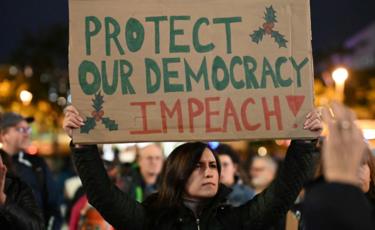BBC/
Donald Trump has become the third US president in history to be impeached by the House of Representatives, setting up a trial in the Senate that will decide whether he remains in office.
The House voted on two charges – that the president had abused his power and that he had obstructed Congress.
Nearly all Democrats voted for the charges and every Republican against.
President Trump’s Republicans control the Senate so it is highly unlikely he will be removed from power.
Democrats are already unhappy at the way the trial could be held. House Speaker Nancy Pelosi has now indicated it might delay sending the articles of impeachment to the Senate, in order to bargain on the terms of the proceedings.
This could put off the trial for an indefinite period, denying Mr Trump his expected acquittal.
Mr Trump remained defiant as the voting took place, telling a campaign rally in Battle Creek, Michigan: “While we’re creating jobs and fighting for Michigan, the radical left in Congress is consumed with envy and hatred and rage.”
Media caption”Cheapened the process of impeachment” – Trump reacts to being impeached
What happened in the votes?
After 10 hours of partisan debate on the merits of the two impeachment charges against President Trump, the House called for votes at about 20:30 on Wednesday (01:30 GMT Thursday).
The first charge is abuse of power, stemming from Mr Trump’s alleged attempt to pressure Ukraine to announce investigations into his Democratic political rival, Joe Biden.
It passed by 230 votes to 197, almost completely on party lines. Only two Democrats opposed – New Jersey’s Jeff Van Drew, who is set to leave the party, and Minnesota’s Collin Peterson.
After 10 hours of partisan debate on the merits of the two impeachment charges against President Trump, the House called for votes at about 20:30 on Wednesday (01:30 GMT Thursday).
The first charge is abuse of power, stemming from Mr Trump’s alleged attempt to pressure Ukraine to announce investigations into his Democratic political rival, Joe Biden.
It passed by 230 votes to 197, almost completely on party lines. Only two Democrats opposed – New Jersey’s Jeff Van Drew, who is set to leave the party, and Minnesota’s Collin Peterson.

The second charge is obstruction of Congress, because the president allegedly refused to co-operate with the impeachment inquiry, withholding documentary evidence and barring his key aides from giving evidence.
It passed by 229-198. Democrat Jared Golden of Maine voted for the first charge but opposed this.
No Republicans supported impeachment, although ex-party member Justin Amash, from Michigan, did.
Democratic presidential candidate Tulsi Gabbard voted “present” on both charges – effectively an abstention. Two members were absent for personal reasons.
Being impeached places Donald Trump alongside only two other presidents in the nation’s history – Andrew Johnson and Bill Clinton.
A day of hyper-partisanship
And so it is done. Donald Trump now becomes the third member of the exclusive club that no-one wants to be a member of.
But the framers of the constitution with its impeachment provision could never have imagined the hyper-partisanship – on both sides – that has been witnessed during today’s sterile House proceedings. Each side with its own narrative, neither side listening to the other. And one can say with some certainty – I would bet all my yet-to-be-gifted Christmas presents – that it will be much the same once this becomes a trial in the Senate in the New Year.
Donald Trump will be acquitted. He won’t be forced from office. So what changes? Well, Donald Trump will have a place in the history books – and for a man with such a huge sense of self that will hurt. Acutely. But 2020? Far from this being a killer blow against President Trump, it might turbo charge his bid for a second term. The House Speaker, Nancy Pelosi, was always wary about going down the impeachment route. We’ll discover next November whether that concern was well founded.
What happens next?
A trial is set to take place in the Senate in the New Year but quite when is unclear.
The Republican Party has a majority, making it almost impossible that the president will be removed from office.
Republican Majority Leader Mitch McConnell said last week that Republican senators would act in “total co-ordination” with the president’s team during the trial, outraging Democrats who pointed out that senators were obliged to act as impartial jurors.
This has led to a growing movement within the Democrats to delay the trial until Mr McConnell – who decides its rules and which witnesses will testify – has been forced to conduct it on more favourable terms.
He is due to address the Senate on Thursday.
Ms Pelosi said: “We will make our decision as to when we are going to send [the impeachment articles] when we see what they are doing on the Senate side. So far, we have not seen anything that looks fair to us.”
She said the Democrats would not name the “managers” – who will present the case in the Senate for impeachment – until this is sorted.
Some Republican aides told the Washington Post that delaying the trial would further fuel the belief that the Democrats were engaged in a partisan abuse of the constitution.
0






